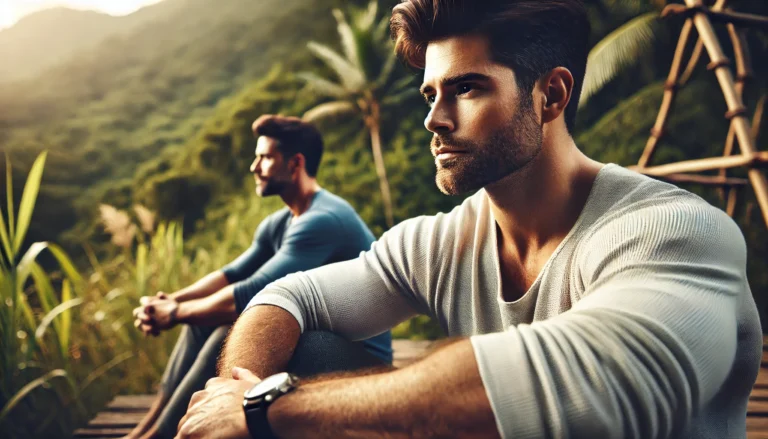The Principles of Masculinity: How to Be a Real Man in the 21st Century
Masculinity has become a widely discussed topic in recent times. As social norms evolve, many men feel confused about what it means to be “a real man” in the 21st century. Traditional masculinity has been challenged by new concepts, creating a need for clarity about what constitutes a balanced and effective masculine life. In this article, we will explore the principles of masculinity through the lens of stoic ideals and influencers such as Andrew Tate, Myron Gaines, Marquett Davon, and Kevin Samuels, who have sought to redefine and reinforce the modern concept of manhood.
Stoicism as the Foundation of Masculinity
Stoicism is an ancient philosophy that can serve as a powerful guide for the modern man. At the heart of this philosophy is the idea that we must control what we can control and accept with serenity what is beyond our reach. Epictetus, one of the great Stoics, taught that “it is not what happens to us, but our opinion of it” that determines our mental state. This wisdom is fundamental to masculinity in the 21st century.
Men who adopt stoic principles understand the need to develop emotional resilience. This means not letting external circumstances easily disturb them. The ability to remain composed under pressure is one of the most important traits of a “real man.” A stoic man does not get shaken by life’s adversities. He remains focused on his goals and makes decisions based on reason, not emotions.
Self-Discipline and Personal Responsibility
Andrew Tate, one of the most notable influencers in this field, is known for promoting a vision of masculinity centered on self-discipline and personal responsibility. He often asserts that a man’s success depends entirely on his ability to be disciplined, work hard, and take full control of his life. For Tate, men must avoid victimhood and focus on achieving excellence in all areas—whether financially, physically, or emotionally.
Self-discipline is undoubtedly one of the strongest pillars of modern masculinity. Men who excel are those who can resist immediate temptations and stay focused on their long-term goals. Thus, self-control—both emotional and physical—becomes one of the most important traits to cultivate.
Leadership and Provider: Masculine Responsibility
For Myron Gaines of the Fresh & Fit podcast, masculinity is strongly linked to the role of leader and provider. Gaines argues that, in a relationship or society, men must take responsibility for leading, making decisions, and protecting their family. This approach is often seen as traditional, but it remains incredibly relevant.
In an era where gender roles have become more fluid, many men lose sight of the importance of taking responsibility for their own lives and for others. This doesn’t mean domination or oppression, but rather leading with wisdom, making tough decisions, and being a point of stability for those around them.
The Value of High Value: Kevin Samuels’ Perspective
Kevin Samuels, a controversial and influential figure, popularized the concept of the “high-value man,” which is a man whose worth is defined by his financial success, social standing, and the positive impact he has on the lives of those around him. A high-value man works to maximize his potential and strives to improve, whether in business, personal development, or relationships.
Samuels also argues that the “high-value man” should be selective about whom he allows into his life, especially when it comes to his romantic partners. He believes that women should also add value to a man’s life, whether emotionally, socially, or in other meaningful ways.
The Importance of Physical Development
Another recurring theme in discussions of masculinity is the importance of physical development. Marquett Davon, also known as The Saint and The Sinner, emphasizes that masculinity is closely tied to a man’s physical condition. Taking care of one’s body—whether through regular exercise, a balanced diet, or an active lifestyle—improves not only physical health but also reflects discipline and self-care.
Physical development is a reflection of mental strength. Men who take care of themselves demonstrate their ability to maintain discipline, focus, and self-sufficiency. It is one of the most evident principles of a man who is in control of his own life.
Relationships and Brotherhood
Lastly, building solid relationships and the ability to create a network of male support is another key element of modern masculinity. Andrew Tate, Myron Gaines, and other influencers often talk about the importance of cultivating friendships and alliances with other men who share the same values. These relationships can serve as a source of support, motivation, and accountability.
In stoic philosophy, this brotherhood is equally important. The Stoics believed in the idea of cosmopolitanism—the notion that we are all part of a great community. For the modern man, this can be interpreted as the importance of creating a circle of trust with men who support one’s growth.
Conclusion: Being a Real Man in the 21st Century
Ultimately, masculinity in the 21st century requires a combination of self-discipline, responsibility, leadership, and emotional resilience. Inspired by stoic principles and contemporary influencers such as Andrew Tate, Myron Gaines, Marquett Davon, and Kevin Samuels, men can cultivate these traits to live fuller and more meaningful lives.
The concept of “being a real man” may have evolved, but the fundamentals—such as self-control, discipline, leadership, and the ability to protect and provide—remain as relevant as ever. A real man is not one who seeks external validation, but one who masters his own destiny with strength, wisdom, and dignity.







